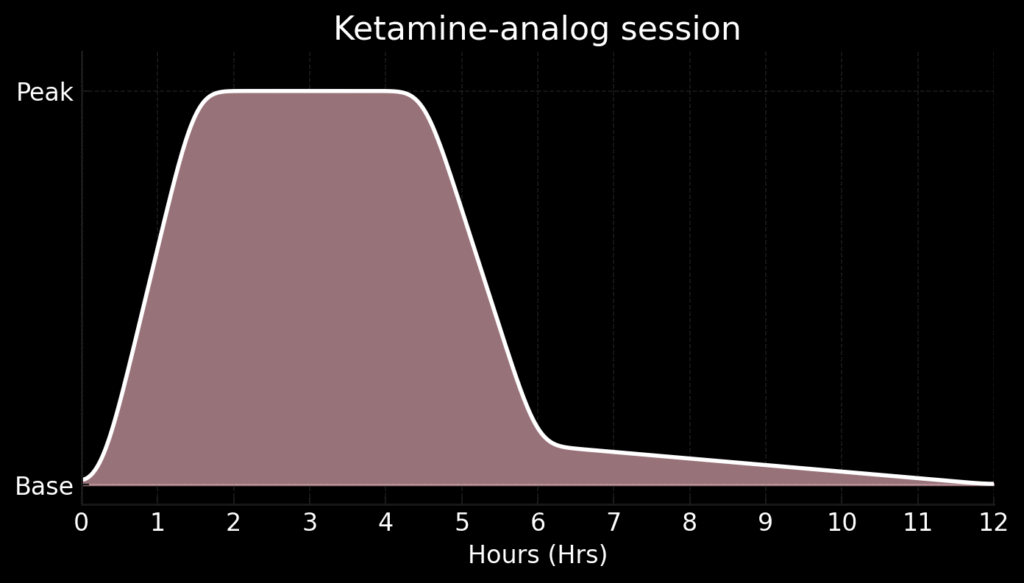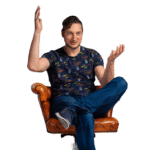Ketamine in science
Ketamine treatments are investigated and used in scientific research because it has unique, fast-acting effects that many other mainstream therapies do not offer. Its main effect is the rapid relief of therapy-resistant depression and suicidal thoughts, where classical antidepressants often take weeks.
In addition, clinical research shows that ketamine can reduce pain and improve quality of life in patients with chronic pain. Furthermore, ketamine in combination with therapy can reduce PTSD symptoms.
Besides its clinical applications, ketamine's unique mechanism of action plays a role in the effectiveness of ketamine therapies. Because it blocks NMDA receptors and stimulates the release of glutamate and BDNF, it can restore synaptic plasticity in the brain, which is beneficial in conditions where neural connectivity is impaired. Moreover, both preclinical and clinical studies have found evidence of neuroprotective and anti-inflammatory effects, so ketamine is also being studied for neurological conditions such as status epilepticus, neuropathic pain and even peri-operative brain protection
Contraindications use of ketamine
Ketamine and the various ketamine analogues with which we have experience are relatively safe substances when used occasionally and under the right conditions. Nevertheless, certain combinations with medications or underlying conditions can pose risks. Therefore, it is important to go through an intake process before booking a ketamine session. This intake assesses whether there is an increased risk of unwanted effects or dangerous combinations. In addition, the intake forms the basis for personal advice on preparation, lifestyle and mindset so that the ketamine session can be guided safely, effectively and tailor-made.
Guidance around ketamine session
A ketamine or ketamine analogue session at Triptherapie proceeds carefully from registration to integration. The therapist is present during the session itself as a trip sitter for harm-reduction and guidance towards personal goals. The start is always the intake, in which health, medication use and intentions are shared. Based on this, it is determined whether a session with a ketamine analogue can be done at all and which therapist is the best fit. Please note that this is not a medical treatment and/or intake. If in doubt about safety, we will refer you to a medical specialist.

In the preparation phase, you will receive personally tailored lifestyle and mental advice that supports the balance of neurotransmitters and helps to make the session as safe and effective as possible. A week before the session, a preparatory meeting takes place with the therapist, during which your goals and expectations are discussed and any exercises or assignments can be given.
During the session itself, time is first taken quietly to reiterate intentions and ask questions. The intake is usually followed by several hours of introspection, silence and guidance where necessary. The peak lasts on average one to three hours and then gradually subsides, with space for post-session discussion and initial integration.
The integration phase often begins during the coming-down. One-hour integration session is included as standard, usually a few days after the session, to deepen insights and translate them into daily life. Those who wish can opt for additional integration sessions or group integration based on psychodrama or IFS, for instance. This way, the experience is not only understood but also integrated emotionally and physically.
Booking therapeutic session with ketamine
You can choose where the session with ketamine or a ketamine analogue takes place. Depending on your preference, our counsellors will visit you at home, or guide sessions in hotels, holiday homes or Airbnb accommodation. We also offer these sessions at our own location in Schiedam. Both individual sessions and group sessions of up to eight people are possible. When a ketamine session is booked with a therapeutic purpose, we recommend keeping the group size limited for more personal attention and depth.
The therapists who can guide sessions with ketamine and ketamine analogues are Marcel, Sascha, Ronald and Gijs. You can view the profile pages of these therapists via the overview below or calculate what a session at your location costs via the calculation module.
Companions for ketamine
Triptherapie employs several therapists and trip sitters who are experienced in guiding sessions with ketamine and ketamine analogues. Below is an overview of the facilitators who offer this type of session. You can open their personal profile page by clicking on the image or name. Via the icons below the counter with the number of guided psychedelic sessions, you can directly view their LinkedIn profile or reviews. In addition, you can use the calendar button to see the availability of each facilitator and book a desired day for your session.
With a background in chemistry, a passion for philosophy, combined with extensive knowledge of psychology and health, his approach is holistic. Marcel is a full-time trip facilitator. With over 2200 guided sessions, Marcel has the most experience of our team.
Ronald is a psychosocial therapist and has completed the following training courses: Jungian Philosophical Therapist, Psychodrama Therapist, Master Voice Dialogue, Transformation Psychology, Internal Family System (IFS), Mindfulness and Compassion Trainer.
Sascha has a good foundation as a psychedelic therapist with her studies in psychology, a Master's degree in Clinical Psychology and work experience in addiction care, (specialist) mental health care and rehabilitation as a psychologist. She has additional training in cognitive behavioral therapy and EMDR.
Gijs has 20 years of experience in outpatient mental health care. He taught and supervised the MGZ-GGZ course at HAN (Arnhem Nijmegen University of Applied Sciences). Gijs has also developed extensively in mindfulness, talk therapy, neurofeedback, meditation, compassion training and ACT.



